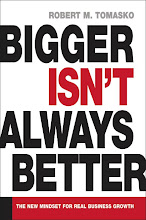December 10, 2008
What fuels it all: Grandiosity
[Excerpt from Chapter 2, Bigger Isn’t Always Better]
These [see last post] are all cognitive errors, not manifestations of greed. They drive bigness, and they are also reinforced by it.
What causes people (especially smart people, as Sternberg and Finkelstein like to point out) to fall into these traps?
We are all prone to distorted thinking from time to time, but when these become our modus operandi for dealing with the world, it is likely that we have become caught up in grandiosity.
This is an occupational hazard to which many leaders are vulnerable. Psychiatrist Roy Lubit notes that people in positions of power can become self-centered and grandiose when those around them treat them with excessive deference, fawn on them, feel reluctant to challenge their views, and fail to provide self-corrective feedback.
Observes Lubit: "If you have power you are probably not as smart, funny, or good looking as people say you are."
Many leaders have risen to senior positions because of their expressed self-confidence, ability to generate enthusiasm in others, and willingness to make tough decisions quickly. As they advance in the hierarchy, they run the risk of having fewer people nearby who are willing to intelligently challenge or add balance to their views, further inflating their sense of self-importance and fueling any tendencies toward arrogance that they have brought with them.
The tendency to provide rock-star-sized pay packages to senior executives reinforces all of this, putting additional distance between them and the others in their organization. Soon the stage is set for unrealistic optimism, egocentrism, omniscience, omnipotence, and invulnerability to take over, and the quest for bigness is primed to become the business's dominant driver.
Link
These [see last post] are all cognitive errors, not manifestations of greed. They drive bigness, and they are also reinforced by it.
What causes people (especially smart people, as Sternberg and Finkelstein like to point out) to fall into these traps?
We are all prone to distorted thinking from time to time, but when these become our modus operandi for dealing with the world, it is likely that we have become caught up in grandiosity.
This is an occupational hazard to which many leaders are vulnerable. Psychiatrist Roy Lubit notes that people in positions of power can become self-centered and grandiose when those around them treat them with excessive deference, fawn on them, feel reluctant to challenge their views, and fail to provide self-corrective feedback.
Observes Lubit: "If you have power you are probably not as smart, funny, or good looking as people say you are."
Many leaders have risen to senior positions because of their expressed self-confidence, ability to generate enthusiasm in others, and willingness to make tough decisions quickly. As they advance in the hierarchy, they run the risk of having fewer people nearby who are willing to intelligently challenge or add balance to their views, further inflating their sense of self-importance and fueling any tendencies toward arrogance that they have brought with them.
The tendency to provide rock-star-sized pay packages to senior executives reinforces all of this, putting additional distance between them and the others in their organization. Soon the stage is set for unrealistic optimism, egocentrism, omniscience, omnipotence, and invulnerability to take over, and the quest for bigness is primed to become the business's dominant driver.
Link
